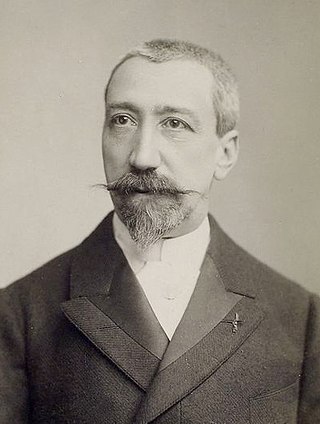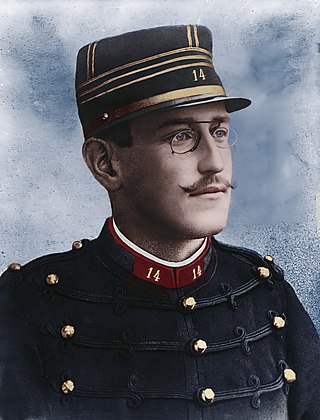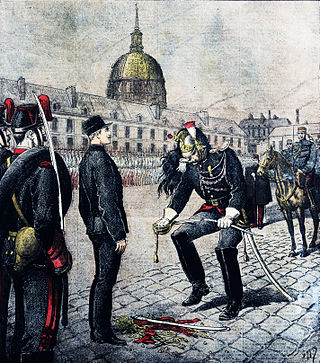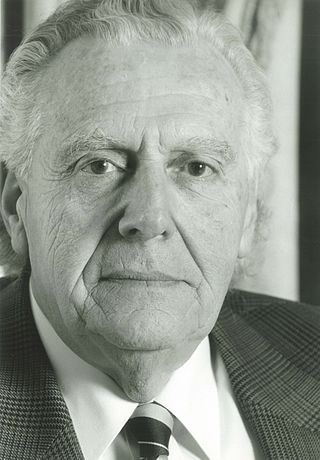Related Research Articles

Anatole France was a French poet, journalist, and novelist with several best-sellers. Ironic and skeptical, he was considered in his day the ideal French man of letters. He was a member of the Académie Française, and won the 1921 Nobel Prize in Literature "in recognition of his brilliant literary achievements, characterized as they are by a nobility of style, a profound human sympathy, grace, and a true Gallic temperament".

Émile Édouard Charles Antoine Zola was a French novelist, journalist, playwright, the best-known practitioner of the literary school of naturalism, and an important contributor to the development of theatrical naturalism. He was a major figure in the political liberalization of France and in the exoneration of the falsely accused and convicted army officer Alfred Dreyfus, which is encapsulated in his renowned newspaper opinion headlined J'Accuse…! Zola was nominated for the first and second Nobel Prize in Literature in 1901 and 1902.

The Dreyfus affair was a political scandal that divided the Third French Republic from 1894 until its resolution in 1906. L'Affaire Dreyfus has come to symbolise modern injustice in the Francophone world; it remains one of the most notable examples of a complex miscarriage of justice and antisemitism. The press played a crucial role in exposing information and in shaping and expressing public opinion on both sides of the conflict.

Alfred Dreyfus was a French artillery officer of Jewish ancestry from Alsace whose trial and conviction in 1894 on charges of treason became one of the most polarizing political dramas in modern French history. The incident has gone down in history as the Dreyfus affair, the reverberations from which were felt throughout Europe. It ultimately ended with Dreyfus' complete exoneration.
A cause célèbre is an issue or incident arousing widespread controversy, outside campaigning, and heated public debate. The term continues in the media in all senses. It is sometimes used positively for celebrated legal cases for their precedent value and more often negatively for infamous ones, whether for scale, outrage, scandal, or conspiracy theories. The term is a French phrase in common usage in English. Since it has been fully adopted into English and is included unitalicized in English dictionaries, it is not normally italicized despite its French origin.

Charles Marie Ferdinand Walsin Esterhazy was an officer in the French Army from 1870 to 1898. He gained notoriety as a spy for the German Empire and the actual perpetrator of the act of treason of which Captain Alfred Dreyfus was wrongfully accused and convicted in 1894.

The Dreyfus Affair began when a bordereau offering to procure French military secrets was recovered by French agents from the waste paper basket of Maximilian Von Schwartzkoppen, the military attaché at the German Embassy in Paris. Blame was quickly pinned upon Alfred Dreyfus, a young French artillery officer who was in training within the French Army's general staff.

While Alfred Dreyfus was serving his sentence on Devil's Island, in France a number of people began to question his guilt. The most notable of these was Major Georges Picquart.

After Major Georges Picquart's exile to Tunisia others took up the cause of the Alfred Dreyfus.

Caran d'Ache was the pseudonym of the 19th century Russian-French satirist and political cartoonist Emmanuel Poiré.

Maurice Pujo was a French journalist and co-founder of the nationalist and monarchist Action Française movement. He became the leader of the Camelots du Roi, the youth organization of the Action Française which took part in many right-wing demonstrations in the years before World War II (1939–45). After World War II he was imprisoned for collaborationist activity.

La Stampa is an Italian daily newspaper published in Turin with an average circulation of 87,143 copies in May 2023. Distributed in Italy and other European nations, it is one of the oldest newspapers in Italy. Until the late 1970s and early 1980s, when the country underwent a nationalization process, La Stampa and Corriere della Sera were not real national daily newspapers, as their geographical area of circulation was mostly limited to Piedmont for La Stampa and Lombardy for Corriere della Sera; thus, both papers shared a readership that was linked to its place of residence and its social class, mostly from the industrialist class and financial circles. La Stampa has "historically" been Turin's newspaper of record. It is considered one of Italy's leading national newspapers alongside Corriere della Sera, la Repubblica, Il Sole 24 Ore, and Il Messaggero.

Émile Gaboriau was a French writer, novelist, journalist, and a pioneer of detective fiction.

Bernard Lazare was a French literary critic, political journalist, polemicist, and anarchist. He is known as the first Dreyfusard.

"J'Accuse...!" is an open letter that was published on 13 January 1898 in the newspaper L'Aurore by Émile Zola in response to the Dreyfus affair. Zola addressed President of France Félix Faure and accused his government of antisemitism and the unlawful jailing of Alfred Dreyfus, a French Army General Staff officer who was sentenced to lifelong penal servitude for espionage. Zola pointed out judicial errors and lack of serious evidence. The letter was printed on the front page of the newspaper and caused a stir in France and abroad. Zola was prosecuted for libel and found guilty on 23 February 1898. To avoid imprisonment, he fled to England, returning home in June 1899.

George R. Whyte was an author, composer, dramatist and art collector. His early education was at Highgate Junior School. A British national of Hungarian Jewish extraction, the Holocaust and the loss of many members of his family in Auschwitz have influenced his creative works which have increasingly focused on the struggle against social injustices especially racism.

Charles Armand Auguste Ferdinand Mercier du Paty de Clam was a French army officer, an amateur graphologist, and a key figure in the Dreyfus affair.

Maximilian Friedrich Wilhelm August Leopold von Schwartzkoppen was a Prussian military officer. After serving as Imperial German military attaché in Paris, Schwartzkoppen was later given the rank of General of the Infantry, and held various senior commands in World War I. He is known for his role in the Dreyfus affair.

An Officer and a Spy is a 2019 historical drama film directed by Roman Polanski about the Dreyfus affair, with a screenplay by Polanski and Robert Harris based on Harris's 2013 novel of the same name. The name J'accuse has its origins in Émile Zola's article in l'Aurore in January 1898 in which the famous author accused many people of France of continuing to support the increasingly blatantly erroneous accusations against Dreyfus.
References
- ↑ Adam Chandler (14 March 2014). "Surprising New Files on the Dreyfus Affair". Tablet . Retrieved 10 February 2024.
- ↑ Adam Gopnik (21 September 2009). "Trial of the Century". The New Yorker . Retrieved 10 February 2024.
- ↑ "Le Dossier secret de l'affaire Dreyfus". Le Monde . 18 October 2012. Retrieved 10 February 2024.
- ↑ Kahina Sekkai (10 March 2013). "Le dossier secret de l'affaire Dreyfus enfin consultable". Paris Match (in French). Retrieved 12 February 2024.
- ↑ Alberto Mattioli (2 November 2012). "La pista dell'omosessualità". La Stampa (in Italian). Retrieved 12 February 2024.